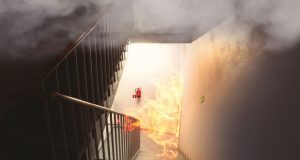 How AI and immersive digital learning is transforming indoor environmental quality education to empower professionals with future-proof skills. By Andy Lord, Founder & CEO, OpenRain
How AI and immersive digital learning is transforming indoor environmental quality education to empower professionals with future-proof skills. By Andy Lord, Founder & CEO, OpenRain
With growing expectations within the built environment to meet regulatory, environmental and wellbeing standards, the need for smarter, more scalable training has never been greater. Facilities managers and property professionals are increasingly required to understand not only asset performance, but also the complex relationship between indoor conditions and human health.
This is particularly relevant when it comes to Indoor Environmental Quality (IEQ), a subject that’s moved from the margins to the mainstream. With the introduction of BS 40102-1:2023, organisations are now being asked to monitor, report on, and improve internal conditions across air quality, thermal comfort, lighting and acoustics. The challenge? Ensuring teams have the knowledge to put these principles into practice.
At OpenRain, we believe the answer lies in a more modern approach to training, which blends AI-enabled content delivery, real-world context and on-demand flexibility. It’s not just about ticking a compliance box. It’s about helping professionals confidently engage with the evolving standards that shape healthier buildings.
WHY IEQ TRAINING NEEDS A RETHINK
Traditional training formats often fail to meet the needs of the modern built environment. Static PowerPoint presentations, lengthy classroom sessions, or passive online modules can struggle to hold attention and often aren’t built for the real-world scenarios professionals face.
IEQ adds complexity to this challenge. It’s a topic rooted in science and data, but its success depends on how well professionals apply it to diverse settings, from housing estates and office blocks to schools and hospitals. Add in the rising expectations from legislation (like the upcoming Awaab’s Law ), and it’s clear that awareness alone isn’t enough.
What is needed is a training experience that’s accessible, practical, and aligned to how people work. That’s where digital delivery and more specifically, AI-supported platforms make a real difference.
WHAT AI BRINGS TO THE TRAINING TABLE
We’ve developed the Foundations in Indoor Environmental Quality (IEQ) Course to make vital knowledge accessible to professionals across facilities management, housing, construction and beyond.
Delivered through the OpenRain Skills Hub, the course combines interactive content, real-world case studies and clear guidance aligned to BS 40102-1 and BRE recommendations.
The platform allows users to access content anytime, from any device, and track their progress as they go, whether they’re working on-site, between meetings, or during quieter moments in their schedule.
While the AI elements aren’t replacing trainers or tutors, they enhance the learning experience by:
- Automating progress tracking.
- Presenting bite-sized, relevant modules in the right sequence.
- Enabling course creators to continuously update and adapt content as standards evolve.
THE BENEFITS TO LEARNERS AND TEAMS
What we’ve found through early rollout is that this approach resonates well with professionals who need clarity, speed, and relevance in their training.
- Real-World Learning – The course uses building scenarios based on real challenges like ventilation issues, condensation risks, or acoustic problems in shared spaces. This helps learners understand how to apply their knowledge in practice.It also highlights the direct links between IEQ and health outcomes.
- Flexibility for Busy Roles – Facilities professionals rarely have the luxury of uninterrupted time. That’s why the Skills Hub is designed to deliver short, self-paced modules that can be completed in stages without compromising on quality or credibility. Learners can revisit sections as needed.
- Aligned to What Matters – The course is fully aligned to BS 40102-1 and incorporates best practice guidance and case law. This ensures that what learners take away from the course is both practical and compliant.
A HEALTHIER FUTURE STARTS WITH SMARTER TRAINING
The launch of BS 40102-1 is a clear signal that indoor environmental quality is no longer optional. It’s now a regulated expectation and one that’s increasingly linked to public health, tenant wellbeing, and organisational accountability.
In this context, training is about more than knowledge. It’s about empowering people to act; to spot risks, raise standards, and improve outcomes.
Whether you’re managing a portfolio of public buildings, delivering retrofit schemes, or simply looking to future-proof your FM strategy, this course provides a timely, practical foundation for building professionals at every level.





